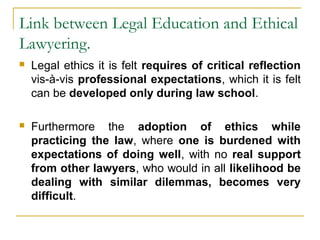Ethical Foundations: Advancing Legal Ethics Education


Exploring the Crucial Role of Legal Ethics Education
Legal ethics form the backbone of the legal profession, emphasizing the principles and values that guide lawyers in their practice. Legal ethics education plays a pivotal role in shaping the ethical compass of future attorneys.
Understanding the Foundations of Legal Ethics
At the core of legal ethics education is a deep understanding of the foundations that govern ethical behavior within the legal profession. Students are introduced to principles such as attorney-client privilege, confidentiality, and the duty to act in the best interests of clients. This forms the basis for ethical decision-making in various legal scenarios.
Navigating the Complexities of Attorney-Client Relationships
Legal ethics education delves into the intricacies of the attorney-client relationship. This includes the duty of loyalty, effective communication, and the responsibility to provide competent representation. Understanding the nuances of these relationships is critical for maintaining trust and upholding the integrity of the legal system.
Addressing Conflicts of Interest
One of the key areas covered in legal ethics education is the identification and management of conflicts of interest. Attorneys must navigate situations where their personal, financial, or professional interests may conflict with those of their clients. Proper training equips legal professionals to recognize and address these conflicts ethically.
Emphasizing Professional Responsibility
Legal ethics education places a significant emphasis on the concept of professional responsibility. This extends beyond individual cases to the broader role lawyers play in promoting justice and upholding the rule of law. The ethical obligations of lawyers to society and the legal system are integral components of their professional identity.
Integrating Technology and Ethical Practice
In the modern legal landscape, the integration of technology introduces new ethical considerations. Legal ethics education adapts to these changes by incorporating discussions on the ethical use of technology, safeguarding client information, and navigating issues related to online communication and social media.
Real-World Case Studies and Ethical Dilemmas
To enhance practical understanding, legal ethics education often incorporates real-world case studies and ethical dilemmas. Analyzing past cases allows students to apply ethical principles to complex situations, preparing them for the ethical challenges they may encounter in their legal careers.
Promoting Diversity and Inclusion
Ethical practice in the legal profession extends to promoting diversity and inclusion. Legal ethics education fosters an understanding of the ethical imperative to ensure equal access to justice and eliminate bias. This inclusivity strengthens the profession and ensures fair representation for all individuals.
Continuing Education for Ethical Excellence
Legal ethics education is not confined to the early stages of a legal career. Continuous learning and professional development are essential for staying abreast of evolving ethical standards and addressing new challenges. Ongoing education reinforces the commitment to ethical excellence throughout a legal professional’s journey.
The Role of Legal Ethics Education in Building Trust
Ultimately, legal ethics education plays a crucial role in building and maintaining public trust in the legal system. Attorneys educated in ethical principles are better equipped to navigate ethical dilemmas, fostering a legal environment where integrity, transparency, and justice prevail.
For an in-depth exploration of Legal Ethics Education, visit Great Blog About. Investing in ethical education lays the foundation for a legal profession characterized by integrity, accountability, and a steadfast commitment to justice.







